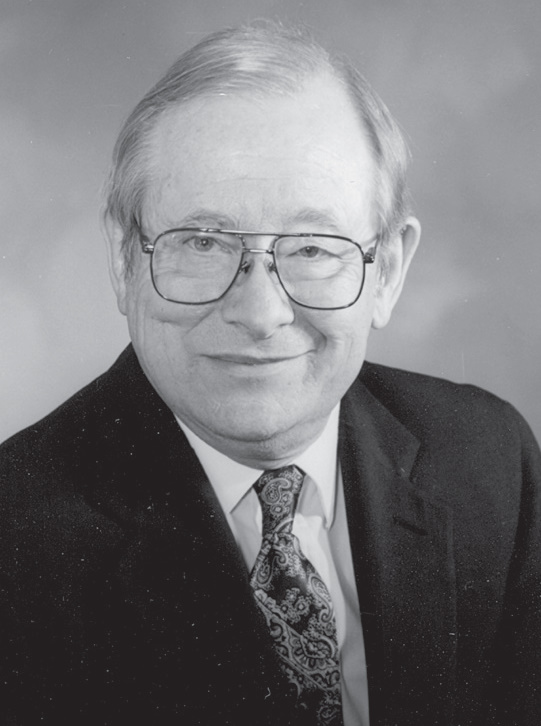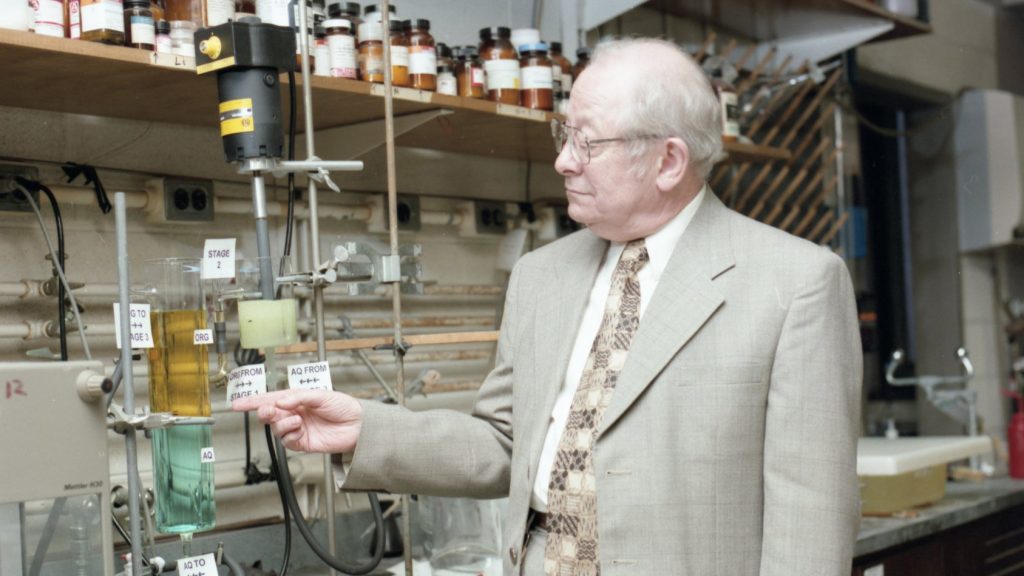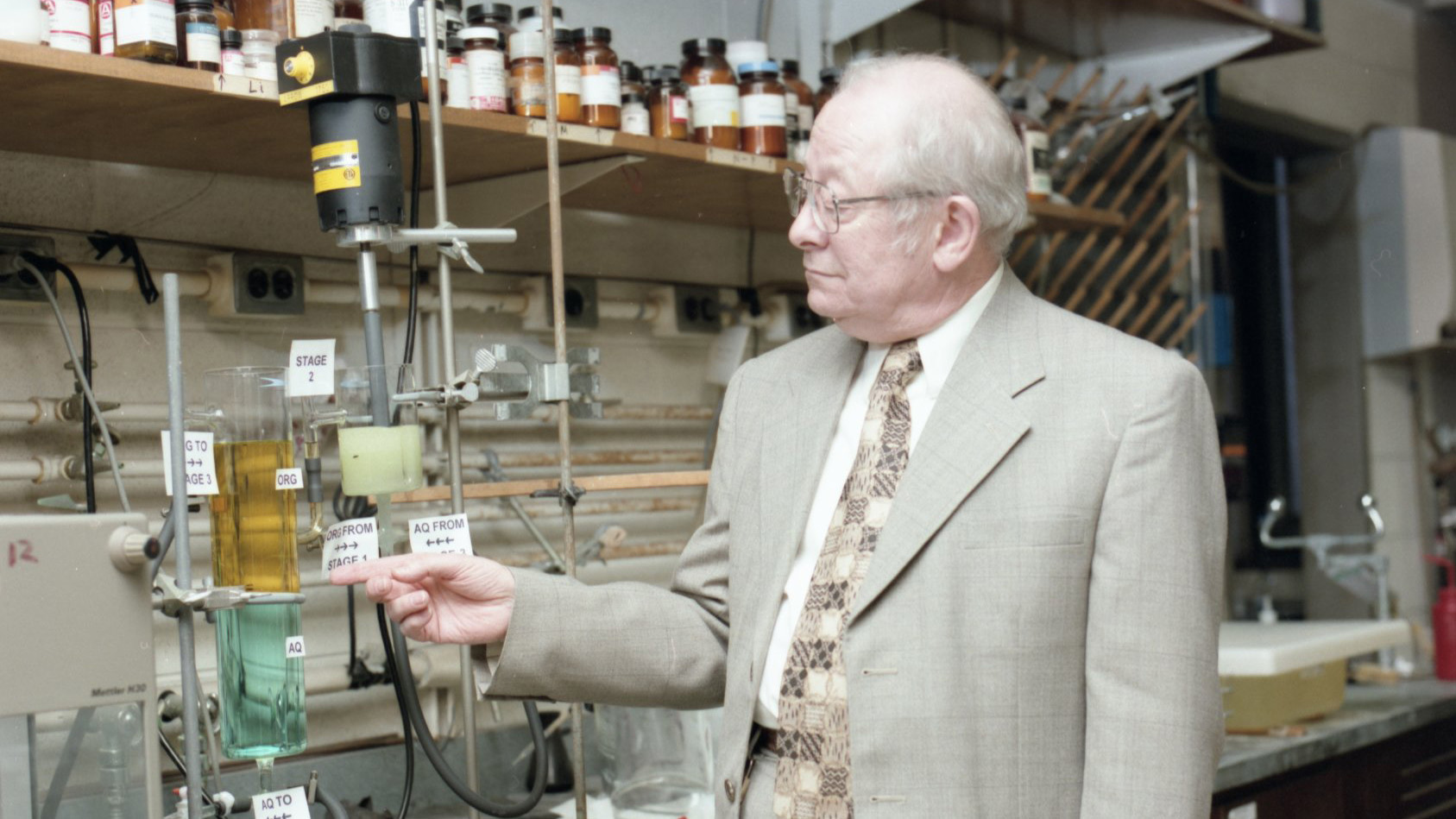Remembering George K. Schweitzer

It is with great sadness that the Department of Chemistry announces the passing of Professor George K. Schweitzer. The longest serving faculty member in the history of the University of Tennessee, Schweitzer will be remembered for his pioneering work in inorganic chemistry and radiochemistry, and by the thousands of students he mentored and taught.
Born in Poplar Bluff, Missouri, Schweitzer earned a BA in chemistry from Central College in 1945. He went on to graduate studies at the University of Illinois, where he was granted a PhD in 1948. Schweitzer moved to Tennessee to join the chemistry faculty in 1948 and in 2023 celebrated his 75th year of teaching at UT.
During World War II, Schweitzer investigated an element similar to uranium and his dissertation work has been described as an extension of the Manhattan Project. He said he came to UT because of its proximity to the Oak Ridge National Laboratory and its relevance to his research. Upon his arrival, Schweitzer was charged with establishing the PhD programs for Inorganic and Radiochemistry.
Schweitzer described his first day of teaching as “a hoot,” noting that, at 23 years old, he was convinced most of the students in his class were older than him. He enjoyed telling the story of that day, when he joined class and sat down to listen to the students discussing the new professor and what they expected him to be like. When the bell sounded for his class to begin, Schweitzer stood and introduced himself to his students, who all laughed.
At a time when the university was just beginning to develop its identity, Schweitzer was already exemplifying what it means to be a Volunteer. He served as radiation safety officer for the State of Tennessee during the Cold War. His work contributed heavily to the development of photoelectron scanning instruments, technology that made some modern medical scanning equipment possible. He was fond of the saying, “I have come to serve, not to be served.”
In 1960, Schweitzer was named the inaugural Macebearer, an award presented to a faculty member who has exhibited longstanding commitment to the university and the community. His love of investigation and the pursuit of knowledge led him to earn an MA in philosophy from Columbia University, followed by a PhD in philosophy from New York University. He was later awarded a ScD for his work in the history of science.
Schweitzer’s colleagues remember him fondly, often recalling his devotion to continued learning. Fellow professor and inorganic chemist Ben Xue met Schweitzer for the first time soon after joining the university in 1992.
“I was deeply impressed by his knowledge of the world, broad interests, and sharp mind,” said Xue. “George was a unique scientist and colleague, and I will miss him.”
During Professor Schweitzer’s time at the university, he served under 13 UT presidents and seven department heads. He saw the creation of the UT College of Veterinary Medicine, the UT College of Nursing, and the development of the UT System itself. He was with the department when it moved into the then newly built Buehler Hall, after spending years working with its namesake, Calvin Buehler. He published more than 150 academic papers and authored 17 books on chemistry and local and family history, including a history of the Department of Chemistry at UT. In 1970 he was named an Alumni Distinguished Professor.

Though he cited his research as his greatest pride point, Schweitzer’s teaching legacy cannot be ignored. Over the years he mentored more than 140 graduate students, ushering them toward PhD and MS degrees. He taught classes in the chemistry, philosophy, history, and nuclear engineering departments, and had the unique experience of teaching the grandchildren of students he had taught before.
“In my four years at the University of Tennessee, I have met with many of our alumni,” said Viktor Nemykin, current head of the Department of Chemistry. “Everyone remembered George and wanted to talk to him. His more than 75 years of service to the department and university are truly unmatched.”
When asked if he planned to retire, Schweitzer once responded that he had considered it at one time, but he had since recovered. He continued to teach into the current academic year and had planned to teach in the spring. With a career as expansive as Professor Schweitzer’s, it is impossible to recount every important contribution made to his discipline, the university, and beyond. At 99 years old, he experienced and contributed to the making of the world as it exists today, teaching and conducting research through most of it. The university and department are unlikely to see his legacy matched, and he will be sorely missed.
Gifts in honor of Dr. Schweitzer may be made here: giving.utk.edu/schweitzer
Share your memories of Dr. Schweitzer with us here.


